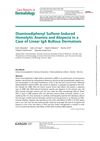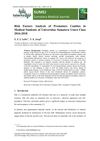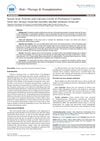 2 citations,
July 2015 in “Case Reports in Dermatology”
2 citations,
July 2015 in “Case Reports in Dermatology” DDS treatment for LABD can cause severe side effects like anemia and hair loss, requiring careful monitoring.
 June 2023 in “Journal of Ayurvedic and herbal medicine”
June 2023 in “Journal of Ayurvedic and herbal medicine” Pumpkin seeds may improve health due to their rich nutrients and potential to treat various conditions.
 January 2015 in “Indian Journal of Medical Biochemistry”
January 2015 in “Indian Journal of Medical Biochemistry” Men with early balding should be checked for metabolic syndrome, as there's a link between the two.
45 citations,
August 2018 in “Haematologica” Macrophage iron release is crucial for hair growth and wound healing.
 September 2017 in “Majallah-i taḥqīqāt-i ̒ulūm-i pizishkī-i Zāhidān”
September 2017 in “Majallah-i taḥqīqāt-i ̒ulūm-i pizishkī-i Zāhidān” Androgenetic alopecia is a long-term, immune-related disorder that starts during puberty due to androgen secretion, and it might be improved with iron tablets, platelet transfusion, and anti-inflammation therapy.
 January 2021 in “Turkiye Klinikleri Journal of Dermatology”
January 2021 in “Turkiye Klinikleri Journal of Dermatology” Many young men with hair loss have low levels of vitamin D and B12.
 January 2020 in “Kocatepe Tıp Dergisi”
January 2020 in “Kocatepe Tıp Dergisi” Not all hair loss patients need lab tests; patient history and physical exams are key to deciding who does.
 6 citations,
October 2005 in “Indian Journal of Dermatology”
6 citations,
October 2005 in “Indian Journal of Dermatology” The document discusses male and female pattern hair loss, its diagnosis methods, FDA-approved treatments like finasteride and minoxidil, their side effects, and the role of lifestyle changes.
 January 2020 in “Open Journal of Obstetrics and Gynecology”
January 2020 in “Open Journal of Obstetrics and Gynecology” All women with Polycystic Ovary Syndrome (PCOS) in a study had at least one skin disorder, with the most common being excessive hair growth, acne, dark skin patches, hair loss, and oily skin.
 January 2016 in “Elsevier eBooks”
January 2016 in “Elsevier eBooks” Finasteride helps hair growth.
 78 citations,
February 2004 in “British Journal of Dermatology”
78 citations,
February 2004 in “British Journal of Dermatology” Melatonin helps hair growth in women with hair loss.
 1 citations,
July 1973 in “British Journal of Dermatology”
1 citations,
July 1973 in “British Journal of Dermatology” The document concludes that secondary syphilis cases are increasing and often misdiagnosed, pityriasis rubra pilaris can be distinguished from psoriasis by skin cell features, and different skin layers produce specific components during skin repair.

Treatments for hair loss vary, but cell-based options may be the future.
 2 citations,
April 2017 in “Plastic and Aesthetic Nursing”
2 citations,
April 2017 in “Plastic and Aesthetic Nursing” Platelet-rich plasma therapy shows promise for hair regrowth in alopecia patients.
 2 citations,
July 1998 in “Dermatologic Clinics”
2 citations,
July 1998 in “Dermatologic Clinics” European dermatologic treatments focus on lifestyle and psychosocial factors, use diverse methods like baths and climate therapy, and emphasize the importance of diet and supplements for skin health.
 2 citations,
August 1997 in “Postgraduate Medicine”
2 citations,
August 1997 in “Postgraduate Medicine” Hair loss common in men and women, limited treatments available.
 February 2021 in “Journal of pharmaceutical and biological sciences”
February 2021 in “Journal of pharmaceutical and biological sciences” No cure exists for alopecia areata, and treatments are personalized.
 January 2020 in “Sumatera Medical Journal”
January 2020 in “Sumatera Medical Journal” Family history and stress are linked to early hair graying, with family history being the main factor.
 August 2024 in “Applied Sciences”
August 2024 in “Applied Sciences” Plant extracts may help prevent or reverse hair graying.
 3 citations,
May 2018 in “Journal of nutritional health & food science”
3 citations,
May 2018 in “Journal of nutritional health & food science” Nutritional supplements can help manage hair loss and promote hair growth by strengthening hair roots and countering harmful effects of pollution, smoking, and deficiencies in vitamins and minerals.
 December 2022 in “Cosmetics”
December 2022 in “Cosmetics” The food supplement improved hair growth and strength in people with a certain type of hair loss and had no major side effects.
 1 citations,
October 2020 in “IP Indian journal of clinical and experimental dermatology”
1 citations,
October 2020 in “IP Indian journal of clinical and experimental dermatology” Low serum ferritin levels are significantly linked to diffuse hair loss.
 28 citations,
October 2007 in “PubMed”
28 citations,
October 2007 in “PubMed” Low iron levels are linked to more hair loss in non-menopausal women.
 January 2025 in “BMC Nephrology”
January 2025 in “BMC Nephrology” Most end-stage renal disease patients in Jordan have skin issues like dryness and itching.
 17 citations,
November 2012 in “Maturitas”
17 citations,
November 2012 in “Maturitas” The conclusion is that proper evaluation and treatment of hair loss in midlife women is important, considering the emotional impact and potential for various treatments.
January 2019 in “Türkiye klinikleri dermatoloji dergisi” Low levels of iron, ferritin, zinc, and folic acid may contribute to hair loss in women.
 7 citations,
January 2016 in “Hair therapy & transplantation”
7 citations,
January 2016 in “Hair therapy & transplantation” People with early graying hair often have lower levels of iron, ferritin, and calcium.
 83 citations,
November 2002 in “British Journal of Dermatology”
83 citations,
November 2002 in “British Journal of Dermatology” Low iron levels are not directly linked to chronic hair loss and iron supplements may not help.
 21 citations,
January 2014 in “Dermatology Research and Practice”
21 citations,
January 2014 in “Dermatology Research and Practice” Hair and serum levels of zinc, copper, and iron are similar in people with alopecia areata and healthy individuals.
 2 citations,
January 2012 in “Hair therapy & transplantation”
2 citations,
January 2012 in “Hair therapy & transplantation” Low serum ferritin levels are not closely linked to telogen effluvium in women.




























